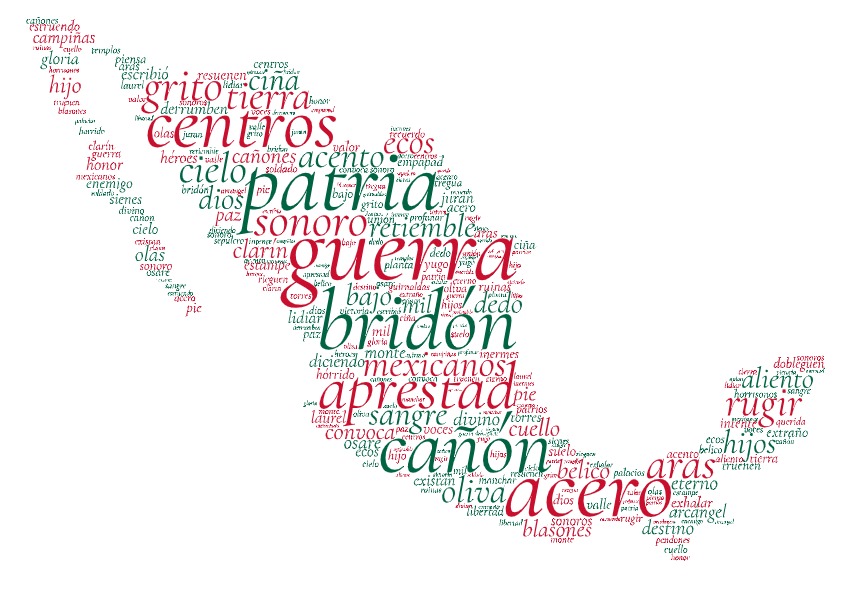
Length: 311 words
Anthem lyrics (use the arrow on the left to collapse this section):
Mexicanos, al grito de guerra
El acero aprestad y el bridón;
Y retiemble en sus centros la tierra
Al sonoro rugir del cañón.
Ciña ¡Oh, Patria! tus sienes de oliva
de la paz el arcángel divino,
que en el cielo tu eterno destino
por el dedo de Dios se escribió.
Mas si osare un extraño enemigo
profanar con su planta tu suelo,
piensa ¡Oh, Patria querida! que el cielo
un soldado en cada hijo te dio.
Mexicanos, al grito de guerra
El acero aprestad y el bridón;
Y retiemble en sus centros la tierra
Al sonoro rugir del cañón.
¡Guerra, guerra sin tregua al que intente
de la patria manchar los blasones!,
¡guerra, guerra! los patrios pendones
en las olas de sangre empapad.
¡Guerra, guerra! en el monte, en el valle,
los cañones horrísonos truenen
y los ecos sonoros resuenen
con las voces de ¡Unión! ¡Libertad!
Mexicanos, al grito de guerra
El acero aprestad y el bridón;
Y retiemble en sus centros la tierra
Al sonoro rugir del cañón.
Antes, Patria, que inermes tus hijos
bajo el yugo su cuello dobleguen,
tus campiñas con sangre se rieguen,
sobre sangre se estampe su pie.
Y tus templos, palacios y torres
se derrumben con hórrido estruendo,
y sus ruinas existan diciendo:
de mil héroes la Patria aquí fue.
Mexicanos, al grito de guerra
El acero aprestad y el bridón;
Y retiemble en sus centros la tierra
Al sonoro rugir del cañón.
¡Patria! ¡Patria!, tus hijos te juran
exhalar en tus aras su aliento,
si el clarín con su bélico acento
los convoca a lidiar con valor.
¡Para ti las guirnaldas de oliva!
¡Un recuerdo para ellos de gloria!
¡Un laurel para ti de victoria!
¡Un sepulcro para ellos de honor!
Mexicanos, al grito de guerra
El acero aprestad y el bridón;
Y retiemble en sus centros la tierra
Al sonoro rugir del cañón.
Historical context:
The national anthem of Mexico dates back to the aftermath of the Mexican-American War and is the result of several false starts and historical evolution.The current anthem, whose lyrics were authored by Francisco González Bocanegra, was the winner in a nationwide competition held in the early 1850s. It was, however, not the first such competition to have been held, or the first winning song. The government sponsored several such competitions after the war’s end. The first winner, in a curious twist of history, was won by a gringo, Andrés Davis Bradburn, the son of a U.S. citizen who had fought with Vicente Guerrero in the Mexican struggle for independence, later worked for the Mexican government in Texas, and had opposed Santa Ana. Although Bradburn’s song, featuring music composed by an Austrian, was not popular and was effectively forgotten, the author stayed in Mexico and took religious orders.
Other competitions followed, but it was the one held in 1853-54 and won by Bocanegra that produced the modern Mexican anthem. As the legend goes, Bocanegra doubted his anthem-writing abilities and hesitated to throw his hat into the ring—until his girlfriend locked him in a room and demanded that he step up to the challenge. Unfortunately for storytellers (but fortunately for Bocanegra, perhaps), this apocryphal episode lacks any supporting evidence. What is true, however, at least according to an official Mexican account, someone sent in another piece written by Bradburn, but Bradburn himself withdrew it. The piece proved popular, although it remained an unofficial anthem until the 1940s.
In terms of the lyrics themselves, the present version contains just a portion of the original lyrics. Several verses that sang the praises of then-president Santa Ana were discarded when the song was given official status, likely due to how history has treated his legacy.
Performance: